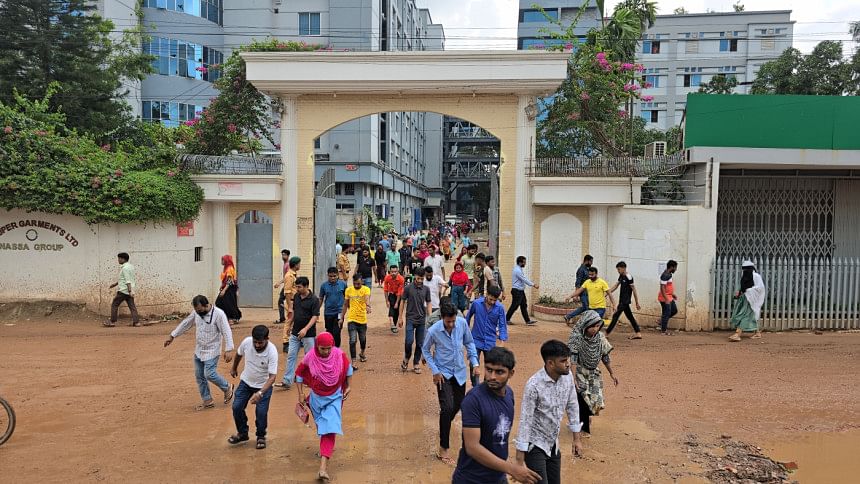30 RMG factories still closed

A total of 30 garment factories in different industrial zones across Bangladesh, especially Ashulia, stayed closed yesterday as safety concerns remained following the recent unrest.
Although the situation is gradually returning to normal, 16 of the 245 garment units in Ashulia were forced to shutter operations as workers did not return after their lunch break.
Additionally, the factory owners are implementing a "no work, no pay" policy under Section 13(1) of the Bangladesh Labour Act.
The other 14 garment units that remained closed yesterday are located in other industrial belts, according to the Bangladesh Garment Manufacturers and Exporters Association (BGMEA).
BGMEA President Khandoker Rafiqul Islam believes the sector will return to complete normalcy by Saturday or Sunday as factory owners are readying to reopen their units after the unrest settles.
Normalcy has already returned to most factories as law enforcement agencies, such as the army and Industrial Police, are deploying extra personnel to improve the law and order situation in certain areas.
Islam informed that production at garment units had been hampered over the past two and a half months due to internet blackouts, general holidays and curfews imposed by the Sheikh Hasina-led Awami League government.
These measures were aimed at quelling an anti-discrimination student movement, which culminated in a mass uprising that ultimately ousted the regime on August 5.
But after the formation of an interim government, garment workers in industrial areas such as Savar, Ashulia, Zirabo and Zirani came up with both logical and illogical demands, Islam said.
However, factory owners say the labour unrest was instigated by vested quarters looking to establish supremacy in the jhoot (waste fabric) business amid the regime change.
This is because jhoot trading is usually controlled by influential people with links to the incumbent government.
Islam said the production losses of affected factories amount to more than $100 million as many of them did not continue operations amid recent crises.
"But now factory owners are trying to resume production hurriedly in order to maintain strict lead times," he added.
Islam explained this is because international buyers are worried about not getting orders from Bangladesh on time as July, August and September are the peak months for shipping goods meant for sale during the Christmas season.
Md Towhidur Rahman, president of the Bangladesh Apparel Workers Federation, said unrest was prevailing at some units which are yet to pay workers' wages for July and August.
BGMEA data shows that 94.82 percent of the factories paid have cleared wages for August.
Rahman also did not rule out the possible involvement of outsiders in the recent unrest.
"But pressure should be placed on factory owners that did not pay their workers' wages to bring full normalcy back to the sector," he said.

 For all latest news, follow The Daily Star's Google News channel.
For all latest news, follow The Daily Star's Google News channel. 



Comments